German postcard by Ufa/Film-Foto, Berlin-Tempelhof, no. PK 4083. Retail price: 25 Pfg. Photo: Lars Looschen / Ufa.
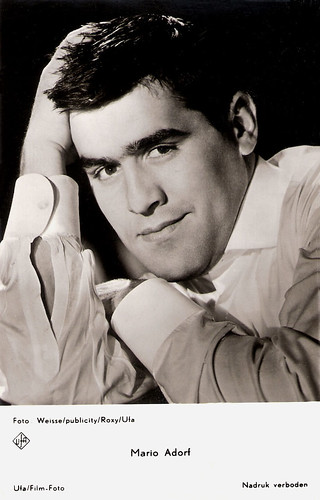
Dutch postcard by Gebr. Spanjersberg N.V., Rotterdam, no. 4745. Photo: Weisse / publicity / Roxy / Ufa.
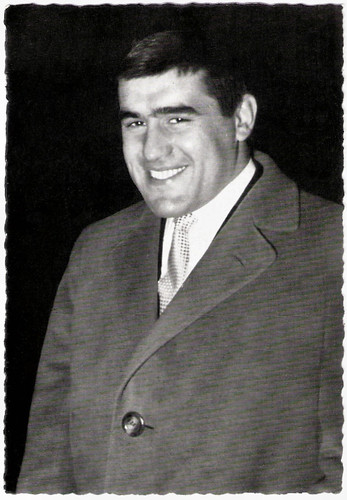
German postcard by WS-Druck, Wanne-Eickel, no. 341. Photo: Erwin Schneider.
An ideal villain
Mario Adorf was born in Zürich, Switzerland, in 1930. He was the illegitimate son of Dr. Matteo Menniti, an Italian surgeon, and Alice Adorf, a German nurse. He grew up in his maternal grandfather's hometown, Mayen in Eifel, Germany, where he was raised by his unmarried mother. He studied at the Universität Mainz and studied drama at the famous Otto-Falckenberg-Schule in München (Munich).
He was still studying drama when he made his film debut as a German soldier in the first instalment of the war trilogy 08/15 (Paul May, 1954). It was a small part but it didn't go unnoticed and it got him new roles in German films. He played a starring part in Das Mädchen Rosemarie/The Girl Rosemary (Rolf Thiele, 1958) with Nadja Tiller. His most remarkable role of this period was Bruno Lüdke, the mentally defective serial killer in the masterpiece Nachts, wenn der Teufel kam/The Devil Strikes at Night (Robert Siodmak, 1957). It earned him his first award, the Bundesfilmpreis (German film award for the outstanding young actor).
Adorf became known in Europe, particularly in Germany. His films included the psychological thriller Die Schachnovelle/Brainwashed (Gerd Oswald, 1960) with Curd Jürgens, and the popular Karl May Western Winnetou I/Apache Gold (Harald Reinl, 1963), in which he played Santer, the bad guy who shot Winnetou’s sister Ntscho-tschi (Marie Versini).
In the early 1960s, Adorf moved to Rome. Spaghetti Western aficionados remember him probably best for his role as 'El Diablo' in Gli Specialisti /Drop Them or I'll Shoot (Sergio Corbucci, 1969) with Johnny Hallyday. He also appeared in such English language films as Major Dundee (Sam Peckinpah, 1965) and the Agatha Christie mystery Ten Little Indians (George Pollock, 1965). He later turned down a role as General Mapache in Sam Peckinpah's The Wild Bunch, because he felt the character was too violent. It would be a decision he still deeply regrets.
At IMDb, Guy Bellinger comments: “His Mediterranean looks, his rugged face, his dark oily frizzy hair and his volubility made him an ideal villain in European-made westerns, spy or mafia films. These films - made in the 1960s - were mostly just commercial and Adorf hammed his parts but he did it so brilliantly that he alone made them watchable.”

German postcard, no. E 31. Photo: Constantin. Mario Adorf (left) as Santer in Winnetou - 1. Teil/Apache Gold (1963). Caption: Santer and his gang are still looking for the Apache gold. Unnoticed they follow the course of the Indians to the hiding place of the treasure.
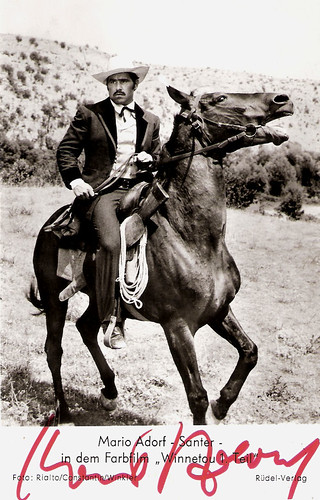
German postcard by Rüdel-Verlag, no. 3930. Photo: Rialto / Constantin / Winkler. Publicity still for Winnetou - 1. Teil/Apache Gold (Harald Reinl, 1963).
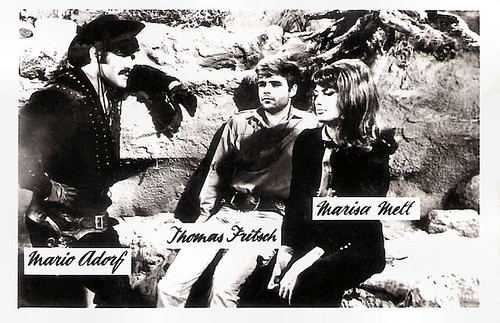
Small Romanian collectors card by Casa Filmului Acin. Photo: publicity still for Der letzte Ritt nach Santa Cruz/The Last Ride to Santa Cruz (Rolf Olsen, 1964) with Thomas Fritsch and Marisa Mell.
The young German cinema
From the 1970s on, the quality of his films improved and Mario Adorf could lend his remarkable acting talents to more ambitious works such as Il Delitto Matteotti/The Assassination of Matteoti (Florestano Vancini, 1973) in which he was a striking Benito Mussolini. Though he worked steadily through the decade, Adorf did not really come to prominence until he appeared in such major features of Der Junge Deutsche Film (The Young German Cinema) as Die Verlorene Ehre der Katharina Blum/The Lost Honor of Katharina Blum (Margarethe von Trotta, Volker Schlöndorff, 1975 and Die Blechtrommel/The Tin Drum (Volker Schlöndorff, 1979).
Lucia Bozzola writes at AllMovie about Die Blechtrommel/The Tin Drum: “New German Cinema forefather Volker Schlöndorff's adaptation of The Tin Drum is a potent Fellini-esque epic of intuitive rebellion against a corrupt world. Shot on location in Poland, Germany, and France, the film mixes the palpable reality of ordinary life in prewar and World War II Danzig with the surreal, innocent perspective of stunted boy/man Oskar as he raises instinctive hell against the horrors he witnesses, first in his family and then as the Nazis take over his hometown. Reaching the heights of comedy in a chaotic Nazi rally and the depths of tragedy during the Danzig post-office siege”. It was one of the most financially successful German films of the 1970s and won the 1979 Oscar for Best Foreign Film and the Palme d’Or (Golden Palm) at the 1979 Cannes Film Festival.
Mario Adorf also worked with Rainer Werner Fassbinder at Lola (1981) featuring Barbara Sukowa.
On TV he played a small role in the BBC adaptation of John le Carré's Smiley's People (Simon Langton, 1982) as a German club owner. In Italy, he was the main protagonist of the TV series Zu Gin (1985), as well as in numerous films. Adorf worked with an impressive list of directors, including Wolfgang Staudte, Billy Wilder, John Frankenheimer, and Claude Chabrol. Likewise, he served many a great author, either in the theatre (such as in William Shakespeare’s Othello, or in Tennessee Williams’ A Streetcar Named Desire) or on the big or small screen (Heinrich Böll, Arthur Schnitzler, Henry Miller, Joseph Conrad, Maxim Gorky, Patrick Süskind).
In the 1990s he changed his image and became the patriarch in such TV films as Der grosse Bellheim/The Great Bellheim (Dieter Wedel, 1993). He also made appearances in international films, including Smilla's Sense of Snow (Bille August, 1997). In 1994, he started a singing career with his solo program Al Dente, and he wrote five novels, including the bestsellers Der Mäusetöter (The Mice Killer, 1992) and Der Dieb von Trastevere (The Thief of Trastevere, 1995). In 2005, he published Mit einer Nadel bloß (With just one needle), a memoir about his mother.
In 1963, Adorf married Lis Verhoeven. The couple had a child, Stella, prior to their divorce. In 1985, he married Monique Faye, with whom he is still married. In 2000, he was honoured with the Bayerischer Filmpreis (Bavarian Film Awards Honorary Award), and a year later with the Großes Bundesverdienstkreuz (Germany's Cross of Merit). In his 90s now, Mario Adorf remains active in German films, television, and theatre. His later pictures include Grapes of Hope (Tunc Okan, 2010) and the comedy Altersglühen - Speed Dating für Senioren/Old glow - Speeddating for Seniors (Jan Georg Schütte, 2014) in which he co-starred with Senta Berger. He even returned as Santer in Winnetou - Der letzte Kampf/Winnetou - The Last Stand (Philipp Stölzl, 2016). In a nod to his initial role as the villain, he is now called Santer Sr. His most recent film is Real Fight (Ahmet Tas, 2021).
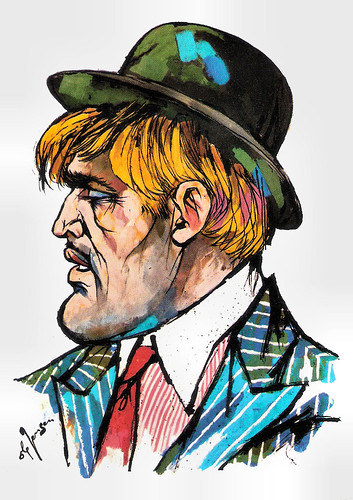
German postcard. Artwork: Ole Jensen. Mario Adorf in Ganovenehre (Wolfgang Staudte, 1966). Caption: Mario Adorf as Artisten-Orje.
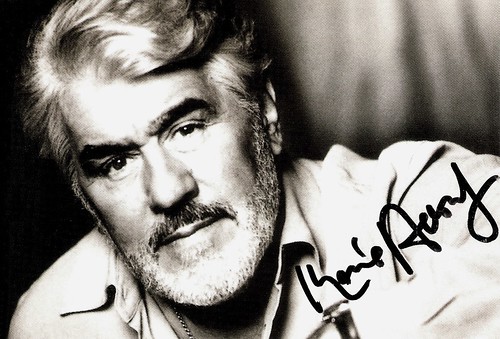
German autograph card.
German trailer for Winnetou I/Apache Gold (1963). Source: Rialto Film (YouTube).
German trailer for Lola (1981). Source: Rialto Film (YouTube).
Sources: Guy Bellinger (IMDb), Sandra Brennan (AllMovie), Lucia Bozzola (AllMovie), Tom B. (Westerns all Italiana), marioadorf.com (German), Wikipedia, and IMDb.
This post was last updated on 10 April 2023.
No comments:
Post a Comment